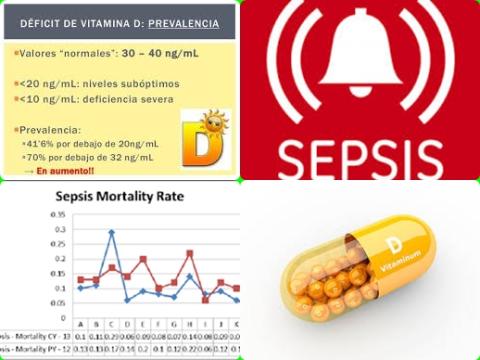
Objectives:
Vitamin D deficiency has been related to the risk of sepsis. However, previous studies showed inconsistent results regarding the association between serum 25-hydroxyvitamin D (25 (OH)D) and mortality risk in septic patients. Therefore, this review article has been conducted.
Does a low serum 25-hydroxyvitamin D (vitamin D level in blood) increase mortality risk in septic patients?
Study design:
This review article included 8 follow-up studies (4 were prospective and the other 4 were retrospective) with 1,736 septic patients.
The sample sizes of the included studies varied from 57 to 610.
The mean ages of the patients included in each study ranged from 57 to 75 years and the proportions of male patients varied from 43% to 71%.
Optimal vitamin D level, vitamin D insufficiency, vitamin D deficiency and severe vitamin D deficiency are defined as serum 25 (OH)D > 30 ng/mL, 21-29 ng/mL and 20 ng/mL, 10 ng/mL, respectively.
There was no publication bias.
Results and conclusions:
The investigators found meta-analysis with a random-effect model showed that septic patients with lower serum 25 (OH)D ( 30 ng/ml) at admission was associated with a significantly increased mortality risk of 93% [adjusted RR = 1.93, 95% CI = 1.41 to 2.63, p 0.001, I2 = 63%, p = 0.003].
Sensitivity analysis by excluding one study at a time did not significantly change the results.
The investigators found subgroup analyses according to the severity of vitamin D deficiency showed that patients with severe vitamin D deficiency ( 10 ng/mL) was significantly associated with a 92% higher mortality risk [adjusted RR = 1.92, 95% CI = 1.09 to 2.55, p 0.001].
But the associations were not significant for vitamin D insufficiency (25 (OH)D = 20-30 ng/mL) or deficiency (25 (OH)D = 10-20 ng/mL).
The investigators found further analyses showed that the association between lower serum 25(OH) D and higher mortality risk were consistent in studies applied different diagnostic criteria for sepsis (SIRS, Sepsis-2.0 or Sepsis-3.0), short-term (within 1 month) and long-term studies (3-12 months) and in prospective and retrospective studies.
The investigators concluded that severe vitamin D deficiency ( 10 ng/mL) is independently associated with increased mortality in patients with sepsis. Large-scale prospective studies are needed to validate these findings.
Original title:
Serum 25-Hydroxyvitamin D and the risk of mortality in adult patients with Sepsis: a meta-analysis by Li Y and Ding S.
Link:
https://www.ncbi.nlm.nih.gov/pmc/articles/PMC7057612/
Additional information of El Mondo:
Find here more information/studies about vitamin D.